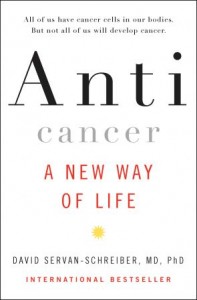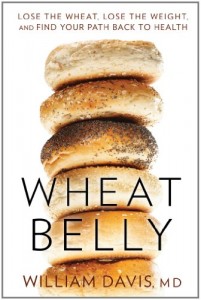AntiCancer and Wheat Belly
My husband recently finished reading “Anticancer – A New Way of Life” written by David Servan-Schreiber, MD, PHD. After being diagnosed with brain cancer, Dr. Servan-Schreiber began a 15 year journey investigating the latest research on how best to fight and prevent cancer. Early in his investigation he discovered that we all have cancerous cells residing in our bodies. Yet, only 1 out of 3 people will die from the activation of these deadly cells.
 Anticancer is an accumulation of his research which surprisingly explains the role both food and stress play in the growth or inhibition of cancerous cells. Although my husband and I are personally aware of the health benefits associated with The Paleo Diet (see “Robb Wolf: Paleo Nutrition Guru), we were pleasantly surprised to learn Dr. Servan-Schreiber’s Anticancer diet recommendations are very similar to those of The Paleo Diet – both of which recommend eliminating all sugars and processed foods from one’s diet.
Anticancer is an accumulation of his research which surprisingly explains the role both food and stress play in the growth or inhibition of cancerous cells. Although my husband and I are personally aware of the health benefits associated with The Paleo Diet (see “Robb Wolf: Paleo Nutrition Guru), we were pleasantly surprised to learn Dr. Servan-Schreiber’s Anticancer diet recommendations are very similar to those of The Paleo Diet – both of which recommend eliminating all sugars and processed foods from one’s diet.
You can read more on Dr. Servan-Schreiber’s anticancer recommendations, published articles, and “research based insight” by visiting his website: Anticancer – A New Way of Life
I’m currently reading Dr. William Davis’ latest book titled “Wheat Belly”. William Davis, MD, a cardiologist and author of the The Heart Scan Blog, also encourages his patients to avoid sugar and processed foods. More specifically, similar to The Paleo Diet he recommends his patients completely eliminate all wheat from their diets (yes, that includes whole wheat breads, pastas, cereals, etc). His book “Wheat Belly” is well-referenced and documents the numerous health issues that can be resolved by simply giving up all whole-wheat products: guaranteed weight loss; reversal of metabolic syndrome and diabetes 2; reduction of systemic inflammation; improvement in LDL bio-markers of health; etc. The same health benefits you can also expect when following The Paleo Diet (see “Paleo Talk Resources”)!
Dr. Davis discusses how wheat eaten today is very different from the wheat eaten by our ancestors. In order to cultivate crops that will produce higher yields and resist pest (insects, bacteria, fungus, etc), seed companies have now begun altering the actual DNA of plants. For a better understanding of how plants are genetically modified and how these modifications impact your health, I also highly recommend watching the documentary “Food Matters“.
Dr. Davis also discusses the high rate of gastrointestinal cancers found in individuals who knowingly or unknowingly have had some form of gluten sensitivity. There is cause for concern when Melissa Smith reports in her book “Going Against the Grain” that 50% of the population is gluten-sensitive. Whole wheat bread is loaded with many anti-nutrients – one of which is gluten. Gluten is known to irritate and damage the intestinal tract (see “Got Leaky Gut?”). Eating genetically-modified plants and long-term wheat consumption by gluten-sensitive individual can result in chronic gastrointestinal inflammation. Could the ill effects of wheat be key in understanding the continual rise of gastrointestinal cancers?
One final thought on diet, wheat and cancer. Few folks understand that a slice of whole wheat bread increases blood glucose more than consuming a teaspoon of table sugar (The Glycemic Load Diet). Michael Eades, MD, author of Protein Power and The 6-Week Cure for the Middle Aged Middle, recently wrote an excellent review on “Wheat Belly”. In this book review, Dr. Eades highlights Dr. Davis’ explanation of how wheat affects blood glucose levels:
…Dr. Davis writes that modern wheat is approximately 70 percent carbohydrate by weight. The carbohydrate is in the form of a starch called amylopectin A.
“The most digestible form of amylopectin, amylopectin A, is the form found in wheat. Because it is the most digestible, it is the form that most enthusiastically increases blood sugar. This explains why, gram for gram, wheat increases blood sugar to a greater degree than, say, kidney beans or potato chips. The amylopectin A of wheat products, “complex” or no, might be regarded as a supercarbohydrate, a form of highly digestible carbohydrate that is more efficiently converted to blood sugar than nearly all the other carbohydrate foods, simple or complex. [Italics in the original.]
It’s well understood that high blood glucose levels result in increased insulin production which in turn increases the body’s ability to store fat. Simply said – eating bread can make you fat. What does this have to do with cancer? For one, sugar just happens to be the food that fuels the growth of most cancer cells:
- Is there a role for carbohydrate restriction in the treatment and prevention of cancer?
- Does Sugar Feed Cancer?
- Cancer and Sugar’s Role In It…
- Can a High-Fat Diet Beat Cancer?
- Cancer and Ketosis
Anti-nutrients, genetically modified plants, gut irritants, autoimmune issues, obesity, diabetes 2, cardiovascular disease, etc – how many more reasons do you need to stop eating sugar and processed foods, especially wheat??!!
Category: Uncategorized · Tags: Cancer, grains, ldl, metabolic syndrome, obesity, silent inflammation, The Paleo Diet, wheat
 EvolvingHealthConcepts
EvolvingHealthConcepts

Pingback: Harvard and Whole Wheat | FitFemaleForty